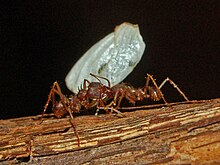Fungus-growing ants
| Attini | |
|---|---|
 |
|
| Atta mexicana workers carrying a leaf section | |
| Scientific classification | |
| Kingdom: | Animalia |
| Phylum: | Arthropoda |
| Class: | Insecta |
| Order: | Hymenoptera |
| Family: | Formicidae |
| Subfamily: | Myrmicinae |
| Tribe: |
Attini Smith, 1858 |
| Type genus | |
|
Atta Fabricius, 1804 |
|
| Genera | |
|
See text |
|
| Diversity | |
| 46 genera | |
See text
Fungus-growing ants (tribe Attini) comprise all the known fungus-growing ant species participating in ant-fungus mutualism. They are the sister group to the subtribe Dacetina.Leafcutter ants, including Atta and Acromyrmex, make up two of the genera. Their cultivars come from the fungal tribe Leucocoprineae of family Agaricaceae.
This New World ant clade is thought to have originated about 60 million years ago in the South American rainforest. While the fungal cultivars of the 'lower' attine ants can survive outside an ant colony, those of 'higher' attine ants are obligate mutualists. This obligate mutualism is thought to have evolved outside of the rainforest, in areas where the fungi would not have been able to survive outside a colony anyway due to the dry environment.
...
Wikipedia
